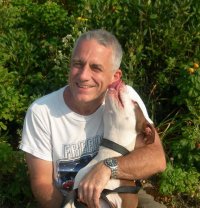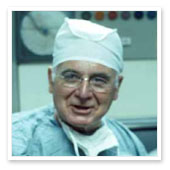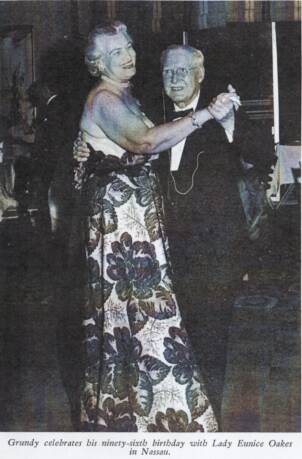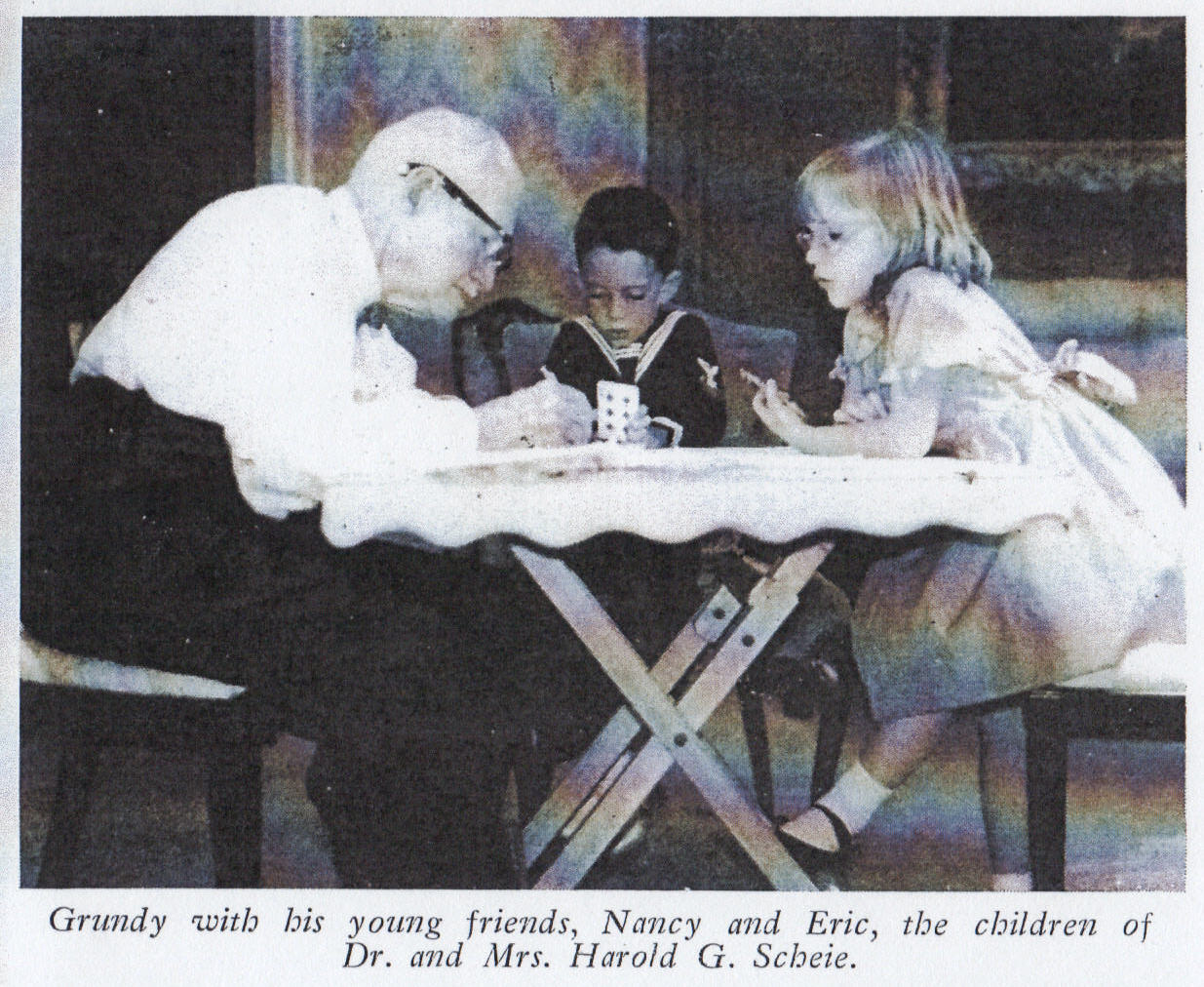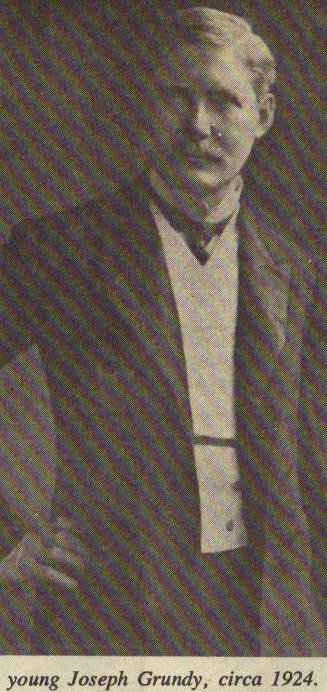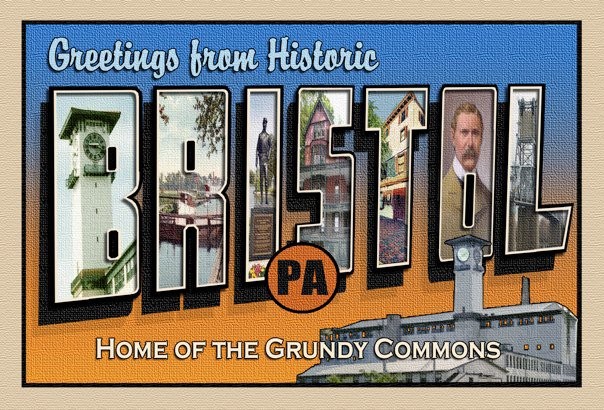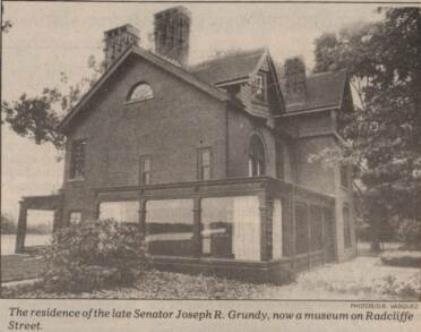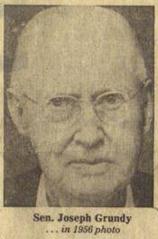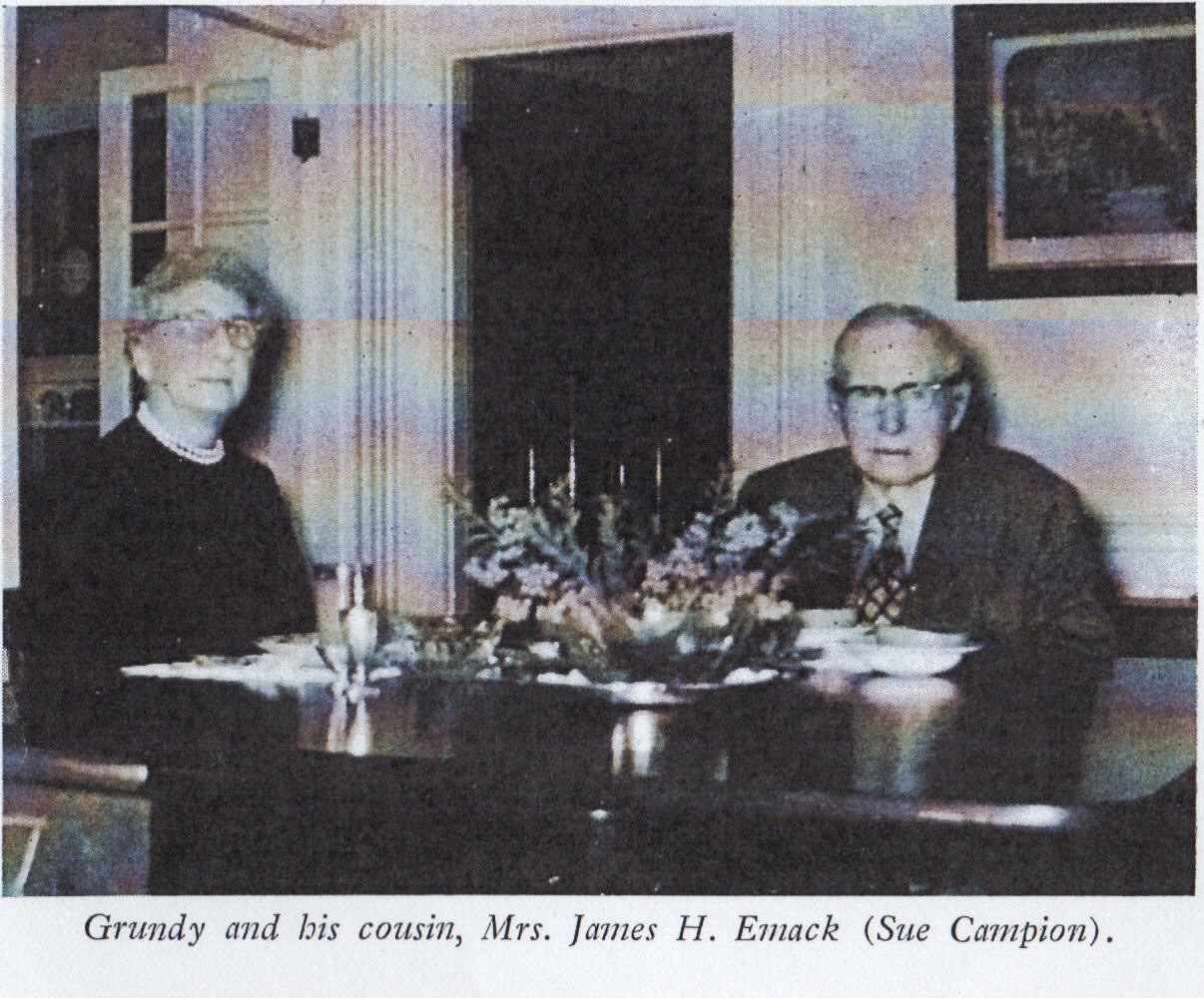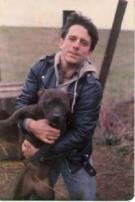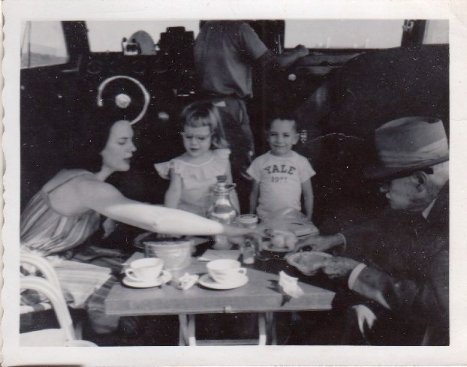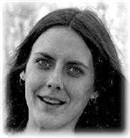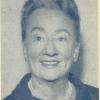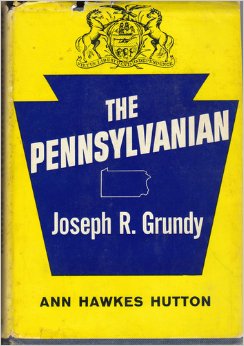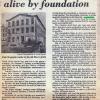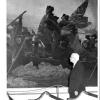Far-sighted Grundy gazed clearly into the Future
by Cate Murway
"I was brought up with the old-fashioned ideas
of doing right, fearing no man and loving my country
and I have tried to do all three."
Joseph Ridgway Grundy [January 13, 1863 – March 3, 1961]
There is an obsequious biography of the gentle Quaker American industrialist and Senator, “The Pennsylvanian-Joseph Grundy”, a conservative Republican lobbyist and head of the Pennsylvania Association of Manufacturers, by the late attorney and distinguished author/historian Ann Hawkes Hutton.
During the 1920’s and 1930’s, he was one of the state’s most powerful politicians. Joseph Grundy was named the 1st Bristol Lions “Citizen of the Year” and he obviously was a compelling believer in the strength of local involvement, perpetuating the principles and ideals of the American spirit. He maintained a great appreciation and was inspired by the significance, courage and fortitude of the leadership before himself with his moral courage, character and duty to state and country. He never lost sight of the sacrifice, the hardship, the suffering and the dedication that made this nation survive.
“If a man does not take pride in his own town, he isn’t likely to give a rap for his country.” Joseph R. Grundy
U.S Senator Joseph R. Grundy died March 3, 1961, almost 50 years ago, but his name lives on in his philanthropic deeds and the literal millions he donated to incalculable charitable, scientific, and literary and public works projects throughout Bucks County.
Pictures in the “The Pennsylvanian-Joseph Grundy” portray Grundy
as public spirited and broad-minded, succeeding in establishing
and maintaining a business at a young age
by sheer force of character, by his boldness,
his self-faith and decidedly 100% commitment.
There is a magnetism in the data frozen in a photographic moment, a glimpse into the past, a jolt of nostalgia, a tantalizing mystery.
An older gentleman, Grundy playing at a card table, sharing his invaluable time with two young children, evoked a calm but yet a deeply involved shared moment in time.
“Enjoy the little things, for one day you may look back and realize they were the big things.”
The small boy in that picture is Ann Arbor, MI attorney, Eric Scheie and his sister, Nancy, who currently resides in NJ.
“What a small world! I'm the Eric Scheie in that picture,
and I have many fond memories of Senator Grundy.
We not only played cards, but we talked politics.
As a matter of fact, he predicted that massive government spending
would eventually lead to precisely the kind of problems
we're having now.
He was a great man, and I am glad to see
that he is being remembered. Keep up the fantastic work.”
Eric’s father, the late Dr. Harold Glendon Scheie a pioneer in several ophthalmologic techniques who founded the Scheie Eye Institute of Philadelphia treated Senator Grundy as a patient and they soon developed a close friendship.
He was the chairman emeritus of the department of ophthalmology at the Medical School of the University of Pennsylvania. In a career in eye care that spanned 55 years, Dr. Scheie (pronounced “shay”) was responsible for developing several important surgical techniques, including the treatment of congenital cataracts and glaucoma and he was the first to describe in detail a rare inherited metabolic disease that can cloud the cornea, now called Scheie's syndrome.
Dr. Scheie was born in Brookings, SD, and received his early education in a one-room schoolhouse on the Fort Berthold Indian Reservation in North Dakota, where his family moved to farm under the Homestead Act.
He was called to active military duty in World War II on May 15, 1942. He served at the United States Army's 20th General Hospital working in bamboo huts with dirt floors in the jungle on the India-Burma border and he saved the sight of Prince Philip’s Uncle, Earl Louis Mountbatten when he seriously injured his eye.
He left the Army as a brigadier general and was awarded the Legion of Merit and made a member of the Order of the British Empire.
He was the only three-time recipient of the Lucien Howe Medal, considered the highest American award for distinguished service to ophthalmology.
Coincidentally, he served in the China Burma India Theater the same time as the late American Jewish WWII Veteran, Army T-4 Sergeant Isadore “Izzy” Brosbe, the pharmacist who sold Senator Grundy his eyewash back in Bristol.
Dr. Scheie received his bachelor's and medical degrees from the University of Minnesota and interned at the Hospital of the University of Pennsylvania, beginning an association with the university that lasted the rest of his life. He was truly accomplished in research and in the scientific side of ophthalmology, as well as a good clinician. When he took over the eye clinic after Dr. Francis Heed Adler, it was an almost windowless, fortress-like building that was referred to as the "Black Hole of Calcutta." It was set apart from the hospital, literally in the backyard, and it was miserably hot in the summer.
His patient, U.S. Senator from PA Joseph Grundy, donated $75,000 to rebuild the wing and to provide rooms for more residents and staff and for Dr. Scheie’s own private practice.
At a later date, he gave the department a million dollar endowment through his Will, a memorial to his sister Margaret M. Grundy.
Joseph Grundy had a chronic eye condition and Dr. Scheie monitored it so he never had to have surgery. He was very grateful.
Dr. Harold Glendon Scheie was quoted as saying, “As chairman, I wanted our department to become the equal of anyone's, but I had never dared to dream of building a separate facility or institute until 1962 when Senator Grundy left a legacy of one million dollars to our department. It was a memorial to his sister Margaret M. Grundy and stimulated me to think of other possibilities.”
Excellence is the result of caring more than others think is wise, risking more than others think is safe, dreaming more than others think is practical, and expecting more than others think is possible.
According to Eric, Senator Grundy was “a very fun guy” and the rummy-like canasta was his favorite game, most likely the game they were playing in the picture.
“He treated me like I was real person, not like a kid.”
Their conversations revolved around the “country’s history and its founding and we would talk about current events.”
Joe Grundy felt a particular reverence toward one of the founding fathers and he dubbed Eric “Alexander Hamilton”. Young Eric had the opportunity to visit the Grundy Mills textile building and the Grundy home. “He was the oldest person I ever met and he lived during the Civil War and I knew him!”
When Eric visited the Grundy home, his mom, Mary Ann [Tallman] would remind him “not to eat too fast because Mr. Grundy ate very slowly”. Eric especially recalls how much the Senator would enjoy his breakfast fruit, eating “every bit, every drop of the grapefruit”.
He remembers him most often wearing Bermuda shorts, a polo shirt and a straw hat when they visited “Jacaranda”, the stately landmark home of the Senator’s “elegant, almost regal” friend, Eunice [MacIntyre], Lady Oakes, the widow of the tenacious, brilliant and generous multi-millionaire Sir Harry Oakes.
Sometimes they would stay for months at the Nassau estate.
Anytime Senator Grundy couldn't immediately remember something, and when it came to him in a minute or two, he would say, "By slow freight, doctor."
His driver was Monroe and he was “big and strong and he could lift Mr. Grundy onto the boat.”
Senator Joe often reminded Eric to be very careful.
Eric recalls that the Senator, because of his poor eyesight, once told him how he broke his finger erroneously reaching for a rat trap, thinking that it was an envelope.
His generosity to the Scheie family included a gift to Eric’s mother. Senator Grundy bought her a 1957 white/aqua Chevy Bel Air station wagon.
“The very moralistic Quaker told amusing stories”.
He shared that when he came in the company of a “sworn political enemy” in public, he would place his hand in his own pocket and squeeze his wallet first, and then shake the gentleman’s hand, saying “my friend”.
While they played cards and went on fishing trips, Joe Grundy would ask Eric’s opinion and they discussed the “future of the country” and how the Senator felt “Roosevelt will make it bankrupt”.
“He told my dad, ‘You probably won’t live to see it, but your son will see it'.”
People would say, “He’s an old conservative man. What does he know?”
“Senator Grundy was no out of touch old crank!”
Eric was very upset when Senator Grundy died and he truly missed him.
“I hoped that he would live to be 100!”
Joseph and Margaret Grundy were raised in an affluent setting that offered them many amenities but they were reared in the family tradition: hard work was essential for one to succeed, and humanitarian efforts, particularly loyalty and assistance to the hometown, were stressed.
Senator Grundy showed his sincere gratitude to Dr. Scheie, the Department of Ophthalmology, and the Hospital of the University of Pennsylvania for treatment he received.
The Scheie Eye Institute of Philadelphia opened for the admission of patients on August 14, 1972, and the first surgery was performed on the fifteenth of August of that year.
The connection based on the found “Kodak moment”, an intense card game, immortalized in “The Pennsylvanian-Joseph Grundy” brought back a flood of memories.
Eric is certain there are pictures somewhere of Senator Joseph Grundy holding him as an infant. The quest has begun.
Joseph Ridgway Grundy: U.S. Senator; statesman; industrialist; Quaker; conservative; politician; lobbyist; philanthropist- "The Pennsylvanian".
Grundy was all of these... and more.
No single quality outweighs the perfect balance of many.
For every disciplined effort, there are multiple rewards.
Senator Joseph R. Grundy didn't just imagine the possibilities.... he became them!
~~~~~~~~~~~~~~~~~~~~~~~~~~~~~~~~~~~~~~~~~~~~~~~~~~~~
Harold Glendon Scheie was born into a homesteading family in South Dakota, the son of Lars T. Scheie and Ella Mae Ware Scheie, and spent his early years living in a sod house on the Berthold Indian reservation. He was educated in the Warren, Minnesota, public school system, and in 1926 he graduated from Warren High School. He attended the University of Minnesota and received a B.S., 1931, graduating with honours in 1935, becoming M.D. in 1936. He completed his Internship, 1935-1937, and Residency, 1938-1940, at the Hospital of the University of Pennsylvania. In 1940, he received a D.Sc., from the University of Pennsylvania. Dr. Scheie secured a position as Instructor and then Associate Professor of Ophthalmology in the Medical School of the University of Pennsylvania, 1940-1942.
Dr. Scheie never charged several groups of patients: the poor, members of the clergy, the military and, surprisingly to some, the rich. His theory was that wealthy patients would return his gift with financial support to enable him to build a unit for total eye care.
He obtained that support and in 1972 opened the Scheie Eye Institute, housing the university's ophthalmology department, at the Presbyterian Medical Center in Philadelphia.
He is survived by his wife, the former Mary Ann Tallman; a son, Eric, of Berkeley, Calif., and a daughter, Nancy, of Somerville, N.J.
~~~~~~~~~~~~~~~~~~~~~~~~~~~~~~~~~~~~~~~~~~~~~~~~~~~~~~
Mary Ann "Polly" Tallman Tryon
Birth: Jul. 5, 1924
Death: Nov. 5, 1999
Philadelphia Inquirer, The (PA) - November 7, 1999
MARY ANN TRYON , 75, DEDICATED VOLUNTEER
Mary Ann Tallman Scheie Tryon, 75, a lifelong volunteer who served in hospitals, Christian organizations and the United Way, died at her home in Haverford on Friday after a long battle with non-Hodgkin's lymphoma.
Mrs. Tryon was the widow of Harold G. Scheie, an internationally known ophthalmologist and legendary surgeon who founded the Scheie Eye Institute in West Philadelphia.
After her husband's death in 1990, she married Philip Tremaine Tryon, an international manufacturer.
For years, Mrs. Tryon was involved in myriad causes. One of the most important was the Friends of Scheie Eye Institute, to which she devoted 25 years.
In 1994, she cochaired the 24th annual Scheie Odyssey Ball - a major fund-raising event for the institute - with her husband, Philip.
Mrs. Tryon began volunteering in 1951, when she made soup and sandwiches at Children's Hospital of Philadelphia.
That same year, she became a solicitor with the United Way and served as a volunteer for more than 20 years. She served as a captain, district director, zone vice chairwoman, vice chairwoman and first vice president. She later founded the United Way's Women's Council and served as its first chairwoman.
Mrs. Tryon graduated cum laude from Drexel University's College of Business in the 1940s, and served for 16 years on the university board of trustees. In 1981, she received an honorary doctor of letters degree from Drexel.
It read: "She has devoted her considerable talents, her unflagging vigor and her ineffable charm to the good works of more than a half hundred boards and committees devoted to human betterment."
Mrs. Tryon also served a number of roles with the Young Women's Christian Association of Philadelphia, and was a board member and chairwoman of the Council on Volunteers of Philadelphia.
She is survived by her husband; a son, Eric; and a daughter, Nancy.
Services will be held at 11 a.m. Tuesday at the Church of the Redeemer in Bryn Mawr. Burial will immediately follow at Laurel Hill Cemetery in Philadelphia.
Memorial donations can be made to the Scheie Eye Institute, 51 North 39th St., Philadelphia 19104.
Philadelphia Inquirer, The (PA)
Date: November 7, 1999
~~~~~~~~~~~~~~~~~~~~~~~~~~~~~~~~~~~~~~~~~~~~~~~~~~~~~~~~~~~~~~~~~~
Birth: Jul. 23, 1916
Death: Nov. 24, 1999
Philadelphia Inquirer, The (PA) - November 27, 1999
PHILIP TRYON , 83, RETIRED EXECUTIVE
Philip T. Tryon, 83, a retired manufacturing executive who at the end of a 42-year career served as board chairman of 12 subsidiary companies of the Berwind Corp. in Philadelphia, died of natural causes Wednesday at his home in Havertown.
Mr. Tryon was a 1936 graduate of the University of Manitoba who two years later earned a master's degree from the Harvard Business School.
Born in Manhattan, Mont., Mr. Tryon moved with his family at a young age to Winnipeg, Manitoba, and was educated in Canadian schools. Specializing in manufacturing at Harvard, he started his career in the field in 1938 at the Bemis Bag Co. in Winnipeg. During World War II, he served as production control manager of the Dominion Bridge Co., turning out gun carriages, aircraft cannons and torpedo engines for the war effort.
He came to Philadelphia and Berwind (now the Berwind Financial Group) in 1965 after working as coordinator of overseas operations for H.J. Heinz Co. in Pittsburgh and as director of manufacturing for Maxwell & Moore, a Stratford, Conn., company specializing in scientific instruments. He and his wife, June, moved to Villanova in 1968.
In his free time, Mr. Tryon devoted himself to furniture making, crafting reproductions of Chippendale, Hepplewhite and Sheraton tables, desks, chairs and sideboards. Mr. Tryon, who had rowed while at Harvard, also had an avid interest in sports. He was a member of the Union League, the Merion Cricket Club, the Merion Golf Club, the Penn Club and the Bachelor Barge Club, the rowing club on Boathouse Row in Fairmount Park.
Mr. Tryon is survived by daughters Lynne Smalley and Sally Lepow, and four grandchildren. His first wife, June, to whom he was married for 48 years, died in 1988. His second wife, Mary Ann Tallman Scheie, the widow of renowned ophthalmologist Harold G. Scheie, died on Nov. 5. Tryon and Scheie were married in 1991.
Services will be at 11 a.m. today in the Chapel of Bringhurst Funeral Home at West Laurel Hill Cemetery, 225 Belmont Ave., Bala Cynwyd.
Philadelphia Inquirer, The (PA)
Date: November 27, 1999
~~~~~~~~~~~~~~~~~~~~~~~~~~~~
5.3.15
from Eric Scheie
Hi Cate, I wanted to let you know my sister Nancy died on April 8. She was disabled most of her life and as a matter of fact, the only picture of her on the Internet is the one you posted showing her playing cards as a little girl with Senator Grundy. The service is set for Saturday May 9 at 10:30 a.m., at West Laurel Hill Cemetery (Bringhurst Funeral Home). Interment will be with my father at Arlington at a future date.
~~~~~~~~~~~~~~~~~~~~~~~~~~~~~~
Birth: Mar. 24, 1909. Death: Mar. 5, 1990
"I stumbled upon this picture of me, my mom, my sister Nancy, and Senator Grundy on his fishing boat."
NANCY WARE SCHEIE
1955 - 2015
NANCY WARE SCHEIE, died on April 8, 2015, from complications related to breast cancer at the Hackettstown Memorial Hospital in Hackettstown, NJ. Daughter of the late Harold G. Scheie M.D. (longtime Chair of the Dept. of Ophthalmology at the University of Penn., founder of the Scheie Eye Institute) and his wife Mary Ann Tallman Scheie Tryon (noted Phila. volunteer).
Born on Oct. 5, 1955, she grew up in Ardmore, attended The Shipley School, graduated in the Class of 1973, and attended Stanford Univ. She worked for the Scheie Eye Institute and at several local businesses, but eventually became disabled for the rest of her life. Notwithstanding her disability, Nancy brought joy to the many people who knew her.
An early user of the Internet when it was in its infancy, Nancy was also an avid collector with a knack for finding and curating unusual items. She is survived by her brother, Eric G. Scheie, of Ann Arbor, Michigan. Nancy's eyes were donated for corneal transplantation (a procedure pioneered by her father).
A Memorial Service will be held at the BRINGHURST FUNERAL HOME at West Laurel Hill Cem. on Saturday May 9, at 10:30 A.M. Int. will be at Arlington National Cem. in her father's grave at a later date. In lieu of flowers, memorial contributions may be sent to the Scheie Eye Institute, 51 N. 39th St, Phila., PA 19104. .
Ann H. Hutton, 94, author and activist
By Sally A. Downey INQUIRER STAFF WRITER
Posted: March 13, 2003
Ann Hawkes Hutton, 94, an author, civic activist, and admirer of George Washington, died of complications of pneumonia Monday at Pine Run Health Center in Doylestown.
"Washington set the path for the presidency," she told a reporter three years ago. "He was practically alone in making decisions during the war, and he was the greatest American who ever lived."
Mrs. Hutton was founder and chairwoman of the board of the Washington Crossing Foundation. The nonprofit organization, formed in the 1950s, promotes Washington's legacy and provides college scholarships for students interested in government service.
For many years, Mrs. Hutton served on the Washington State Historic Park Commission. The state park in Bucks County is on the Delaware River on the site where on Christmas 1776 Washington and his troops boarded boats and crossed to New Jersey to surprise Hessian troops.
She wrote several books and a play about the event.
In the 1950s Mrs. Hutton arranged for the 21-foot painting Washington Crossing the Delaware by Emanuel Leutze to be put on exhibit in the Washington Crossing Historic Park Memorial Building. When the painting's owner, the Metropolitan Museum of Art in New York, asked for it back in 1969, she commissioned an artist to paint a copy in honor of her recently deceased husband, L. John Hutton.
The painting inspired annual reenactments of the crossing, and in 1976, she was the first woman to join the reenactors.
A lifelong resident of Bucks County, Mrs. Hutton grew up in Bristol and graduated from Friends Select School in Philadelphia. She earned her bachelor's and law degrees from the University of Pennsylvania.
She married in 1939 and she and her husband moved next door to her family's Bristol home, Shadyside. Fifteen years ago she donated Shadyside to the Washington Crossing Foundation.
Mrs. Hutton was active with many civic organizations.
She was named a 1958 Distinguished Daughter of Pennsylvania and received a freedom leadership award from the Freedoms Foundation at Valley Forge and a medal of honor from the Daughters of the American Revolution.
Her daughter, Katharine Hutton Tweedy, said Mrs. Hutton was intensely patriotic and serious about American history but also had a sense of humor. "She loved George Washington," she said, "and she loved Elvis Presley too."
In addition to her daughter, she is survived by two granddaughters and five great-grandchildren.
The funeral will be at noon Saturday at Shadyside, 6943 N. Radcliffe St., Bristol. Friends may call at 10:30 a.m. Burial will be private.
Memorial contributions may be made to the Washington Crossing Foundation, 6934 N. Radcliffe St., Bristol, Pa. 19007.
Contact staff writer Sally A. Downey at 215-854-2913 or sdowney@phillynews.com.
~~~~~~~~~~~~~~~~~~~~~~~~~~~~~~~~~~~~~~~~~~~~~~~~~~~~
Trustee and former Grundy Foundation director retires;
will forever be remembered as the face of the foundation
Oct 1, 2016
BRISTOL BOROUGH >> The Grundy Foundation has announced the retirement of Leonard N. Snyder from the Board of Trustees effective July 31. Snyder’s decision to retire comes after a combined 48 years working as both executive director and trustee of The Grundy Foundation.
Snyder will forever be remembered as the face of The Grundy Foundation within the community. He spent 22 years as executive director and 26 years as a trustee serving Bristol Borough and its surrounding environs.
During his tenure, the Grundy Library interior and museum exterior were refurbished; skating rinks at the Grundy Arena were built; Mill Street was improved and the land behind the shopping district was donated to the borough for parking; numerous impact grants to Bristol Borough for improvements and to charitable organizations for support were made; and the purchase and transformation of a movie house into today’s award-winning Bristol Riverside Theatre occurred.
Snyder always had the best interests of the foundation in mind and genuinely regarded staff as its strongest asset. His devotion to the foundation and the impact it had on his beloved Bristol Borough very much epitomized what Senator Joseph R. Grundy famously quipped, “If a man does not take pride in his own town, he isn’t likely to give a rap for his country.”
Former Executive Director of the James A. Michener Museum, Bruce Katsiff, said, “For decades Len Snyder used his positions with the Grundy Foundation to improve the quality of life in our community. He supported social service activity, housing for seniors, arts and culture, economic development, education and many other activities designed to make Bucks County a better place to live. His creative approaches to problem solving have left a positive mark on our county.”
Bristol Riverside Theatre’s Founding & Producing Director Susan Atkinson believes “working with Len Snyder over the past 35 years, from the inception of the idea of Bristol Riverside Theatre to its fruition and now to celebrating its 30th year, has been one of the true joys of my creative life. Len has been a strong, inventive, and always inquisitive partner over the years. He has been a true gift to not only the theater but to Bristol. We are truly a very fortunate town.”
Dave Harris, owner of Harris Comfort, remembers fondly Snyder’s contributions to the area as a member of the Bristol Rotary. “Len was a member of Rotary for over 50 years and was past president of the Bristol Club, he also had fifty years of perfect attendance. While serving the Grundy Foundation, he took great interest in promoting projects in Bucks County and particularly those in Bristol Borough. As far as I can remember his big dream was the conversion of the Bristol Art Theatre into what is now the Bristol Riverside Theatre.”
Fellow Grundy Foundation Trustee Frederick M. LaValley, Esq. shares his praises, “As a board member, Len was always prepared, astute and diligent, and always the consummate gentleman.”
In a statement, Eugene Williams, Esq., Executive Director of The Grundy Foundation, said that “Mr. Snyder will be greatly missed by the entire staff of The Grundy Foundation, Museum, and Library,” adding, “He is irreplaceable in terms of knowledge about the foundation’s history. And because much of that history involved Snyder’s central role as the conscience and driving force for positive change in Bristol and communities county-wide, he leaves behind a legacy as one of the most dynamic and influential persons ever to be associated with the Grundy name.”
click on thumbnail
to enlarge
2.17.1985
LaVO: Joe Grundy was Bristol’s king-maker
By Carl LaVO / Correspondent
Posted Apr 2, 2018 at 6:00 AM
Joe Grundy did a lot for his hometown, yet he worsened the Great Depression.
I’ve been meaning for some time to write about Joe Grundy’s role in the country’s worst economic meltdown. The challenge was to reveal the American colossus and Bristol benefactor in 800 words. Since timing is a great motivator given all the talk in D.C. about tariffs, now is the moment.
Joseph Ridgway Grundy was born in 1863 in Camden, New Jersey, during the Civil War. The son of a Quaker businessman, he graduated from Swarthmore and went to work in Pop’s textile mill in Bristol Borough. On his father’s death in 1893, Joe, 30, took over the mill. His personal charm and business acumen led to greater prosperity. So much so that by 1909 he founded and presided over the powerful Pennsylvania Manufacturers Association. The following year he built a seven-story warehouse and wool spinning mill mounted by a 168-foot-high clock tower to symbolize Bristol’s industrial might. By 1915, the mill was Bucks County’s largest with nearly 1,000 workers.
Joe Grundy, like his only sibling Margaret, never married. He was a devout Quaker, characterized by the use of “thee” and “thou” in conversation. He served as town councilman for three decades. He donated property and personally financed the town’s public waterworks, municipal sewer system, schools, a post office, municipal building, firehouse, playgrounds and athletic fields in the 2-square-mile borough. If the town budget fell into deficit, Grundy pulled out his checkbook. By all accounts, he was scrupulously honest, genial and a workaholic. He never boasted about his charity and wanted no credit.
In state politics, Grundy raised vast sums to support Republican candidates and campaigned relentlessly against foreign imports. In D.C., critics called him “king of lobbyists” and tossed around “Grundyism” to besmirch his strident views. An Iowa newspaper described him as “a rich Pennsylvanian who believes that the sun rises and sets in the protective tariff.” He agreed, telling the New York Times he favored “a general revision of the tariff upward, that every section of the country with all labor in every industry and business may reap the benefit and enjoy profitable prosperity.”
A Congressional panel investigating lobbyists amid the great stock market crash of 1929 called Grundy, 66, to testify. Despised for his blunt talk and perceived arrogance, he sat a few feet from his antagonists. According to biographer Ann Hawkes Hutton, “His round, china-blue eyes surveyed the committee members with amused calm while his mouth curved in the famed, shy smile that was feared by knowing adversaries.”
They had reason to be wary. Joe Grundy had used his fundraising clout to help elect three successive American presidents in the 1920s — GOPers Warren Harding, Calvin Coolidge and Herbert Hoover. Grundy was unshakable, adamant he paid his way in all affairs. The panel turned up nothing. The following year Old Joe assumed a vacancy in the U.S. Senate, where he crafted amendments to the Smoot-Hawley Tariff Act to not only protect agriculture but American manufacturing. In short order, lawmakers passed a broad spectrum of tariff fees on 20,000 imported goods. Economists and even Henry Ford demanded Hoover veto the bill.
Despite initial opposition to tariffs, the president approved the new fees in June 1930. Import duties rose to historic highs. Foreign nations stopped purchasing American goods and imposed tariffs of their own. A trade war and the Great Depression spread around the world.By 1934, unemployment in the U.S. reached 24 percent. More than 5,000 banks failed. Homelessness accelerated. The stage was set for World War II.
Joe Grundy, who never lost faith in tariffs, returned home after two years in the Senate. He and sister Margaret, born in Burlington County, New Jersey, remained active in Bristol civic affairs. Both played major roles in restoration of Pennsbury Manor. Margaret lived with her mother in the family’s beautiful Walnut Grove Farm overlooking Neshaminy Creek 5 miles from town.
Margaret died at age 85 in 1952. Joe, who sold his business in 1947, passed away at 98 in the Bahamas in 1961. Before leaving Bristol, he reflected to a friend, “After living from the time of the Civil War through three more wars and having witnessed a great many things taking place, I’m convinced the good Lord never intended the younger generation to profit from the lessons of their elders. I believe they are all meant to make mistakes, suffer, and learn the hard way.”
His last act was establishing a foundation to manage his wealth for the betterment of Bristol. He also endowed the construction and support of the Margaret R. Grundy Memorial Library in memory of his sister. Completed in 1966, it adjoins his Radcliffe Street mansion, now a museum. In my estimation, the library is the finest in Bucks, with garden walks and panoramic views of the Delaware River in a town on the economic rebound.
Sources include “The Pennsylvanian: Joseph R. Grundy” by Ann Hawkes Hutton published in 1962 and “The petition against the Smoot-Hawley Tariff Bill” by Bernard C. Beaudreau in the Real-World Economics Review of April 7, 2016. Thanks also to Grundy library archivist Eric Walerko for providing photos for this column.
Want to live to 100?
Joe Grundy, 98, almost made it. He never had a serious illness. He believed good genes and diet made the difference. So what was his regimen besides no naps? His biographer, Ann Hawkes Hutton, gives us a summary:
Rise at 6 a.m.
Hearty breakfast: Grapefruit, orange juice too, 3 slices of bacon, one soft-boiled egg, one piece of cracked wheat toast, one pat of butter.
Take a brisk walk.
Before lunch, one drink of Old Grand-Dad bourbon whiskey on the rocks.
Lunch: Creamed dried beef or lamb chops with several vegetables, especially fresh asparagus. Fresh fruit and cookies for dessert. Afterward, cream with coffee and poured over baked apples.
Before dinner, one drink of Old Grand-Dad on the rocks.
Gourmet dinner: Choices vary: sauteed sea bass fillet, turkey with roast chestnuts, Cornish hen with wild rice, or larded tenderloin. Dessert often was vanilla ice cream with guava slices and guava sauce.
Before bed, a small glass of Old Grand-Dad or Jack Daniels on ice.
To sleep by 11, awake at 6 refreshed.
~~~~~~~~~~~~~~~~~~~~~~~~~~~~~~~~~~~~~~~~~~~~~~~~
Senator Joseph R. Grundy age 95
at Washington Crossing State Park looking at the painting “Washington Crossing the Delaware” by Emanuel Leutze when the original painting was on loan from the Metropolitan Museum of Art.
click on thumbnail to enlarge
